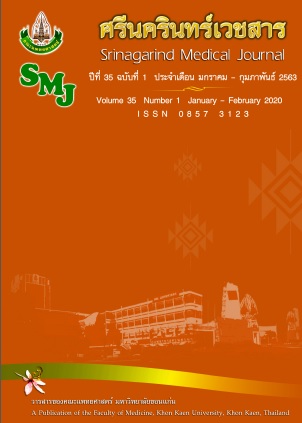Incidence of Acute Kidney Injury by Neonatal RIFLE Criteria in NICU
Keywords:
acute kidney injury; neonates; neonatalAbstract
Background and objective: Acute kidney injury (AKI) is an important contributing factor to the mortality of critically ill neonates. However, the standardized AKI for this population is still inconclusive until neonatal RIFLE score has been proposed in 2013. This study aimed to identify the incidence of AKI in critically ill neonates by using neonatal RIFLE.
Methods: In this descriptive, retrospective study included all neonates admitted to the tertiary care NICU during January 2013-December 2014. The patient demographics, co-morbidities, and outcomes data were recorded. AKI was classified by neonatal RIFLE into urine output-based criteria and serum creatinine-based criteria. The objectives were 1. To determine the incidence of AKI as defined by neonatal RIFLE score in NICU. 2. To identify factors affecting AKI in critically ill neonates.
Results: A total of 263 neonates were enrolled. The incidence of AKI by neonatal RIFLE was 24.3%, compared with 8% of those diagnosed by attending physicians (p<0.001). Forty-eight of 64 patients (75%) with AKI were classified by urine output criteria only, eight patients (12.5%) were diagnosed by eGFR criteria only and eight patients (12.5%) matched both criteria. Congenital heart diseases and administration of vancomycin were found to be significant independent factors of AKI in the NICU (p<0.05). Most neonates with AKI (81.3%) had complete renal recovery. The mortality rate of neonates with AKI by neonatal RIFLE was 26.5% compared to 4% of neonates without AKI.
Conclusion: The incidence of neonatal AKI by using urine output criteria from neonatal RIFLE was high (24%) and useful to detect and early management of neonatal AKI.
References
2. Vogy BA, Dell KM. The kidney and urinary tract of the neonate. In: Martin RJ, Fanaroff AA, Walsh MC, editors. Fanaroff and Martin's neonatal-perinatal medicine. 10th ed. Philadelphia: Saunders; 2015: 1676-99.
3. Koralkar R, Ambalavanan N, Levitan E, McGwin G, Goldstein S, Askenazi D. Acute kidney injury reduces survival in very low birthweight infants. Pediatr Res 2011; 69: 354-8.
4. Bezerra C, Vaz Cunha L, Liborio A. Defining reduced urine output in neonatal ICU: importance for mortality and acute kidney injury classification. Nephrol Dial Transplant 2013; 28: 901-9.
5. Vachvanichsanong P, McNeil E, Dissaneevate S, Dissaneewate P, Chanvitan P, Janjindamai W. Neonatal acute kidney injury in a tertiary center in a developing country. Nephrol Dial Transplant 2012; 27: 973-7.
6. Bellomo R, Ronco C, Kellum JA, Mehta RL, Palevsky P, Bonventre JV, et al. Acute renal failure-definition, outcome measures, animal models, fluid therapy and information technology needs: the Second International Consensus Conference of the Acute Dialysis Quality Initiative (ADQI) Group. Crit Care 2004; 8: R204-12.
7. Mehta RL, Kellum JA, Shah SV, Molitoris BA, Ronco C, Warnock DG, Levin A. Acute Kidney Injury Network: report of an initiative to improve outcomes in acute kidney injury. Crit Care 2007; 11: R31.
8. Akcan-Arikan A, Zappitelli M, Loftis LL, Washburn KK, Jefferson LS, Goldstein SL. Modified RIFLE criteria in critically ill children with acute kidney injury. Kidney Int 2007; 71: 1028-35.
9. Ricci Z, Ronco C. Neonatal RIFLE. Nephrol Dial Transplant 2013; 28: 2211-14.
10. Schwartz G, Munoz A, Schneider M, Mak R, Kaskel F, Warady B, et al. New equations to estimate GFR in children with CKD. J Am Soc Nephrol 2009; 20: 629-37.
11. AlAbbas A, Campbell A, Skippen P, Human D, Matsell D, Mammen C. Epidemiology of cardiac surgery-associated acute kidney injury in neonates: a retrospective study. Pediatr Nephrol 2013; 28: 1127-34.
12. Selewski DT, Jordan BK, Askenazi DJ, Dechert RE, Sarkar S. Acute kidney injury in asphyxiated newborns treated with therapeutic hypothermia. J Pediatr 2013; 163: 725-9.
13. Hsu C, Lee C, Su C, Wang Y, Chen H, Chuang J, et al. Incidence, outcomes, and risk factors of community-acquired and hospital-acquired acute kidney injury. Medicine (Baltimore) 2016; 95: e3674.
14. Rustagi R, Arora K, Das R, Pooni P, Singh D. Incidence, risk factors and outcome of acute kidney injury in critically ill children – a developing country perspective. Paediatr Int Child Health 2016: 1-7.
15. Slater M, Gruneir A, Rochon P, Howard A, Koren G, Parshuram C. Risk factors of acute kidney injury in critically ill children. Pediatr Crit Care Med 2016; 17: e391-8.
16. Cataldi L, Leone R, Moretti U, Mitri B, Fanos V, Ruggeri, et al. Potential risk factors for the development of acute renal failure in preterm newborn infants: a case-control study. Arch Dis Child Fetal Neonatal Ed 2005; 90: F514-9.
17. Cuzzolin L, Fanos V, Pinna B, di Marzio M, Perin M, Tramontozzi P, et al. Postnatal renal function in preterm newborns: a role of diseases, drugs and therapeutic interventions. Pediatr Nephrol 2006; 21: 931-8.
18. Zappitelli M, Selewski D, Askenazi D. Nephrotoxic medication exposure and acute kidney injury in neonates. Neoreviews 2012; 13: e420-7.
19. McKamy S, Hernandez E, Jahng M, Moriwaki T, Deveikis A, Le J. Incidence and risk factors influencing the development of vancomycin nephrotoxicity in children. J Pediatr 2011; 158: 422-6.
20. Selewski DT, Charlton JR, Jetton JG, Guillet R, Mhanna MJ, Askenazi DJ, et al. Neonatal acute kidney injury. Pediatrics 2015; 132: e463-73.




